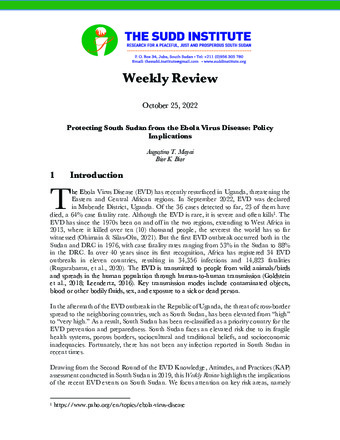Protecting South Sudan from the Ebola Virus Disease: Policy Implications
Publication Summary
In the aftermath of the EVD outbreak in the Republic of Uganda, the threat of cross-border spread to the neighboring countries, such as South Sudan, has been elevated from “high” to “very high.” As a result, South Sudan has been re-classified as a priority country for the EVD prevention and preparedness. South Sudan faces an elevated risk due to its fragile health systems, porous borders, sociocultural and traditional beliefs, and socioeconomic inadequacies. Fortunately,there has not been any infection reported in South Sudan in recent times.
Drawing from the Second Round of the EVD Knowledge, Attitudes, and Practices (KAP) assessment conducted in South Sudan in 2019, this Weekly Review highlights the implications of the recent EVD events on South Sudan. We focus attention on key risk areas, namely general awareness on infection sources, symptoms/signs, transmission modes, and how these outcomes vary by place (i.e., county) and sociodemographic factors (i.e., education, gender, age, and religion). Understanding people’s knowledge on the above and its relation to one’s residence and sociodemographic factors helps us better inform the Ministry of Health’s preparedness and readiness to respond to a potential EVD outbreak.
Bior K. Bior is a Visiting Fellow (VF) at the Sudd Institute, with a broad research interest in Communal Security Dilemma, inter- and intra-tribal relations and Political Sociology in South Sudan. He holds a Bachelor’s degree in Biological Sciences (B.S.) and a Minor in Sociology from the University of Vermont (UVM), as well as a PhD in Cells and Molecular Biology/Neuroscience from the same institution.
Augustino Ting Mayai's Biography
Augustino Ting Mayai is the former Managing Director of the Sudd Institute. He is a founding Research Director of the same institution, serving in this capacity for a decade. He holds a Ph.D. in Sociology, with concentrations on demography and development from the University of Wisconsin-Madison. He currently studies how state effectiveness affects child health outcomes in South Sudan and Ethiopia. Dr. Mayai has written extensively on South Sudan’s current affairs. August is the current Chair (Statistician General) of the National Bureau of Statistics, Government of South Sudan.

